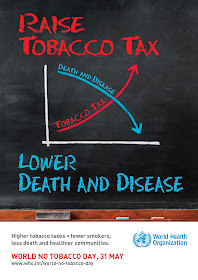The Science of Substance Abuse
Dirk Hanson
Articles and health studies about drugs, addiction and alcoholism, including the most recent scientific and medical findings.
Monday, May 26, 2014
Smoking Is Over If You Want It
Happy World No Tobacco Day
It’s one of the annual days of note concocted by the World Health Organization (WHO). The motive is undeniably noble, and the goofy negative title makes it a favorite of mine: Saturday, May 31, is the annual World No Tobacco Day.
This year, WHO and its partner organizations around the world are focusing on the economics of the global tobacco trade by urging nations to raise taxes on tobacco products. Raising taxes has two potential effects: It drives down consumption and it provides revenue for government health spending on tobacco-related illness and prevention. This latter concern will only grow in the U.S., as the aging boomer cohort reaches the decade of maximum ravagement from smoking-related diseases.
A tax increase that boosts the price of tobacco by 10% “decreases tobacco consumption by about 4% in high-income countries and by up to 8% in most low- and middle-income countries,” according to the organization. And this sweetener: “The World Health Report 2010 indicated that a 50% increase in tobacco excise taxes would generate a little more than US$ 1.4 billion in additional funds in 22 low-income countries. If allocated to health, government health spending in these countries could increase by up to 50%.”
What is the alternative? A bleak epidemic that will be killing more than 8 million people every year by 2030. “More than 80% of these preventable deaths will be among people living in low-and middle-income countries,” says WHO. The tax hammer is not as widely used for tobacco control as common sense might suggest. WHO says that “only 32 countries, less than 8% of the world's population, have tobacco tax rates greater than 75% of the retail price.” Even so, tobacco tax revenues are on average 175 times higher than spending on tobacco control, WHO data shows.
WHO also urges continued ad bans as a means of lowering consumption. “Only 24 countries, representing 10% of the world’s population, have completely banned all forms of tobacco advertising, promotion and sponsorship. Around one country in three has minimal or no restrictions at all on tobacco advertising, promotion and sponsorship.”
For more info, write the WHO Media Centre at mediainquiries@who.int.

Smelling better is one of the things that happens
ReplyDeletewhen you quit smoking, allowing you to move through crowded places with confidence.
They can research information about this drug available
in many websites. They are used as aids in nicotine replacement therapy.